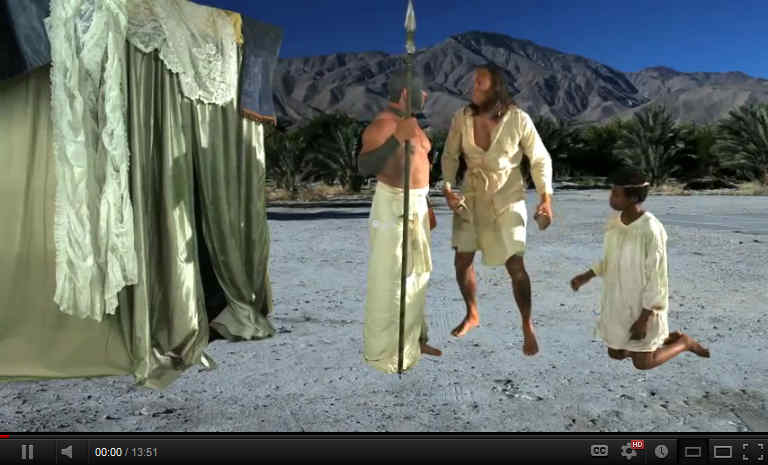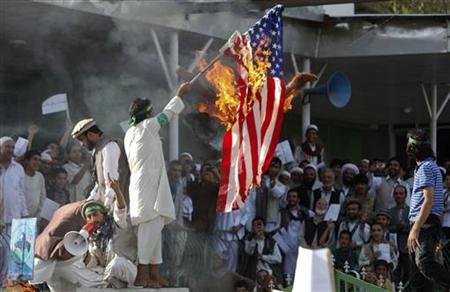Khadijah
One of the creepier scenes in the movie represents Mohammed ibn Abdallah's
terror and confusion upon receipt of his first revelation. Mohammed did himself wonder whether his visitant was a demon:
"And I [Mohammed] came to Khadija and sat by her thigh and drew close to her. She said, 'O Abul-Qasim, where hast
thou been? By God, I sent my messengers in search of thee, and they reached the high ground above Mecca and returned to me. I said to her, 'Woe is me poet or possessed.' She said,
'I take refuge in God from that O Abul-Qasim. God would not
treat you thus since he knows your truthfulness, your great
trustworthiness, your fine character, and your kindness. This
cannot be, my dear. Perhaps you did see something.' 'Yes, I
did,' I said. . .Then she rose and gathered her garments about
her and set forth to her cousin Waraqa. . .who had become a
Christian and read the scriptures and learned from those that
follow the Torah and the Gospel. And when she related to him
what the apostle of God told her he had seen and heard, Waraqa
cried, 'Holy! Holy!'" (The Life of Muhammad, A Translation of Ishaq's Sirat Rasul
Allah, A. Guillaume, pp. 106-107).
Certainly the material could have been presented more tastefully.
However the movie-makers did not make up the episode; not only is it
found in Ibn Ishaq, Mohammed's earliest biographer, but also in the
Hadith, of canonical authority for most Muslims:
"Then Allah's Apostle returned with
the Inspiration and with his heart beating severely. Then he went to
Khadija bint Khuwailid and said, 'Cover me! Cover me!' They covered
him till his fear was over and after that he told her everything
that had happened and said, 'I fear that something may happen to
me.' Khadija replied, 'Never! By Allah, Allah will never disgrace
you. You keep good relations with your Kith and kin, help the poor
and the destitute, serve your guests generously and assist the
deserving calamity-afflicted ones.'" (Sahih al-Bukhari, Volume 1,
Book 1, Number 3).
Maybe they should ban Ibn Ishaq, though
Ibn Ishaq himself, as well as most of his readers, profess
Islam; and if they ever bite the bullet and ban the Hadith, many forms of Islam with
disappear alongside.
The odd little demon-dance of Khadijah and Mohammed requires explanation.
It begins with hokey-pokey type moves, then ends with her disrobing:
"Ismail b. Abu Hakim, a freedman of the family of al-Zubayr, told me on Khadija's authority that she said to the apostle of God, 'O son of my uncle, are you able to tell me about your visitant, when he comes to you?' He replied that he could, and she asked him to tell her when he came. So when Gabriel came to him, as he was wont, the apostle said to Khadija, 'This is Gabriel who has just come to me.' 'Get up, O son of my uncle,' she said, 'and sit by my left thigh.' The apostle did so, and she said, 'Can you see him?' 'Yes,' he said. She said,'Then turn round and sit on my right thigh.' He did so, and she said, 'Can you see him?' When he said that he could she asked him to move and sit in her lap. When he had done this she again asked if he could see him, and when he said yes, she disclosed her form and cast aside her veil while the apostle was sitting in her lap. Then she said, 'Can you see him?' And he replied, 'No.' She said, 'O son of my uncle, rejoice and be of good heart, by God he is an angel and not a satan.'"
(The Life of Muhammad, A Translation of Ishaq's Sirat Rasul
Allah, A. Guillaume, p. 107)
Khadijah's thought process seems to be, if Mohammed's new-found
friend, the familiar spirit who had begun visiting him, had been
a baleful demon rather than an angel, he would have hung around
and watched the strip show. The fact that he left proved him
modest and well-behaved. At any rate this is Khadijah's theory: real angels don't stick around to watch the lap dance.
While I would not have staged this scene the same way as did the
movie-makers,— I'm visualizing the older Khadijah as a large,
heavy-set woman, and Mohammed as somewhat smaller, not exactly a
doll for her to play with on her lap, but it must be realized if
Mohammed were a line-backer type and she a pert little lady, he
could not have sat on her lap,— certainly they must be allowed the
poetic license to make sense of a rather confusing episode.
If we envision Khadijah as a big, Brunhilda-type, then at least the
episode can be staged in accord with Ibn Ishaq's stage directions,
otherwise not. Khadijah's rule of thumb for distinguishing between angels and
demons seems to be that a beneficent angel will display proper
decorum and leave when things start to get hot, while a
baleful demon will stay, make himself at home, and eagerly watch the
show; they don't mind salacious content, because their tastes in
entertainment are so much lower. Where she got her information I don't know, perhaps from local
folklore.

|


